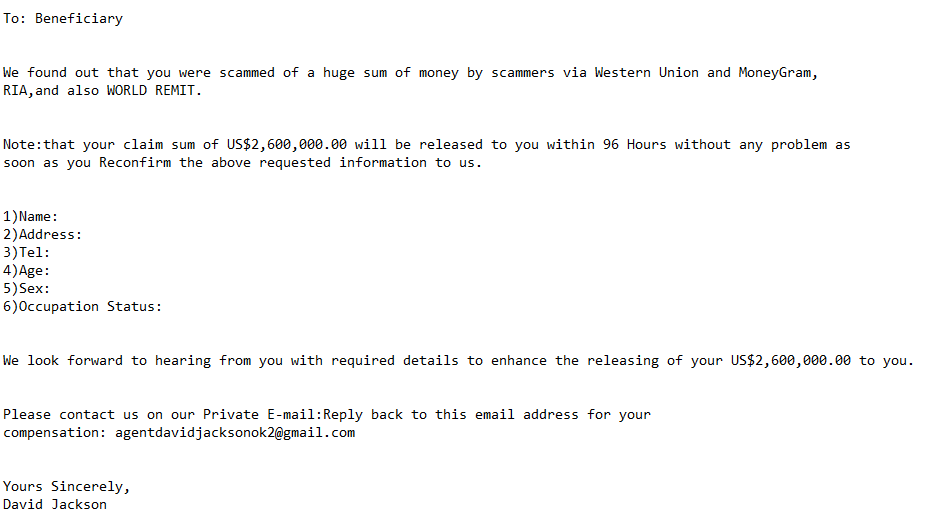What is the “You Were Scammed A Huge Sum Of Money” email scam
“You Were Scammed A Huge Sum Of Money” email falls into the scam/spam email category. The email claims the recipient has been scammed out of $2,600,000.00 and the money can be “returned” if the recipient provides the necessary personal information.
The “You Were Scammed A Huge Sum Of Money” email scam is an example of the classic scams that claim users have won, inherited, etc., large sums of money. The most known example of these scams is the “Nigerian Prince” spam emails that claim a Nigerian prince wants to move money outside the country and has chosen the recipient to help them do that. These scams are usually after users’ personal information. Some also try to steal users’ money.
According to this “You Were Scammed A Huge Sum Of Money” email scam, the recipient has been scammed out of $2,600,000.00 by scammers via Western Union, MoneyGram, RIA, and WORLD REMIT. The sender does not introduce themselves properly, nor do they explain why they possess users’ supposed stolen money. They just claim to be someone named David Jackson. The recipient is supposed to assume they’re employed in one of the four mentioned money transfer companies.
To get the supposedly stolen money back, the recipient has to provide some information, including full name, home address, phone number, age, sex, and occupation status. The money will supposedly be released within 96 hours.
The full “You Were Scammed A Huge Sum Of Money” email is below:
Subject: HELLO
To: Beneficiary
We found out that you were scammed of a huge sum of money by scammers via Western Union and MoneyGram, RIA,and also WORLD REMIT.
Note:that your claim sum of US$2,600,000.00 will be released to you within 96 Hours without any problem as soon as you Reconfirm the above requested information to us.
1)Name:
2)Address:
3)Tel:
4)Age:
5)Sex:
6)Occupation Status:We look forward to hearing from you with required details to enhance the releasing of your US$2,600,000.00 to you.
Please contact us on our Private E-mail:Reply back to this email address for your compensation: agentdavidjacksonok2@gmail.com
Yours Sincerely,
David Jackson
If users engage with the email and send their personal information, the scammer will reply back asking for more personal information. At some point, they will likely ask for banking information so they can supposedly send the money. They may also ask for credit card information.
Personal information like full name, home address, and phone number are hot commodity information among cybercriminals. The stolen information can be used to perform sophisticated scams as people are more likely to fall for a scam if scammers address them by name and/or mention other personal information. If they ask for credit/payment card details, scammers will use them to make unauthorized purchases and steal money.
When it comes to emails like “You Were Scammed A Huge Sum Of Money”, if it sounds too good to be true, it is. Nothing about the email looks remotely legitimate. It’s likely targeting the older generation who may not be familiar with such scams.
How did scammers get your email address?
If users receive scams, spam, or malicious emails, it’s likely because their email addresses have been leaked or stolen during a data breach. Users can check on haveibeenpwned whether their email address is part of a data breach. Users should also keep in mind that all kinds of personal information can be leaked along with email addresses. There’s not much users can do if their information has already leaked but they can at least be more vigilant when dealing with strange emails, phone calls, etc.
Site Disclaimer
WiperSoft.com is not sponsored, affiliated, linked to or owned by malware developers or distributors that are referred to in this article. The article does NOT endorse or promote malicious programs. The intention behind it is to present useful information that will help users to detect and eliminate malware from their computer by using WiperSoft and/or the manual removal guide.
The article should only be used for educational purposes. If you follow the instructions provided in the article, you agree to be bound by this disclaimer. We do not guarantee that the article will aid you in completely removing the malware from your PC. Malicious programs are constantly developing, which is why it is not always easy or possible to clean the computer by using only the manual removal guide.

